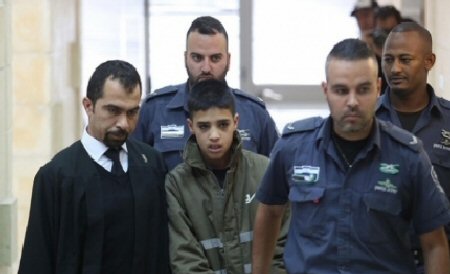Israeli Occupation Forces (IOF) arrested more than 5,500 Palestinians from the occupied Palestinian territory during 2019; among them were 889 children and at least 128 women, the Palestine News Network reported.
The Palestinian Prisoners and Human Rights Institutions issued a fact sheet, on Monday, stating that the number of Palestinian prisoners and detainees in the prisons of the occupation up unitl the date of preparing the paper, reached approximately 5000, including 40 females, while the number of child detainees reached approximately 200 children, and the number of administrative detainees reached about 450.
The Israeli occupation authorities escalated their arbitrary arrests of Palestinian minors and women, and practiced various forms of torture against them during and after their arrest, during the year 2019.
According to the follow-up of partner institutions, on the reality of the prisoners inside the Israeli prisons and detention centers, the issue of torture topped the scene compared to the past few years, specifically after the month of August 2019, where the detention operations escalated, and all groups of Palestinian society were targeted.
During 2019, the occupation killed five prisoners through its systematic policies, the most prominent of which is medical negligence, not to mention psychological and physical torture.
The Palestinian men that died in Israeli jails, or martyrs were: Fares Baroud, Omar Awni Younis, Nassar Taqatqa, Bassam Al-Sayeh, and Sami Abu Diak, and the detention of two bodies continues.
Four prisoners, including the prisoner Aziz Owaisat, was killed as a result of torture in 2018, Fares Baroud, Nassar Taqatqa and Bassam Al-Sayeh. This brings the number of martyrs of the captive national movement to 222 martyrs since 1967.
The Israeli occupation continued to issue administrative detention orders against Palestinians, as the number of administrative detention orders issued during the year 2019 reached (1035). Among the orders that were issued against 4 minors and 4 women.
The occupation forces carried out repression and incursions inside prisons, which caused dozens of prisoners to be injured, including severe injuries, the most severe of which were in “Ofer, the Negev, and Ramon” prisons, where, according to testimonies, documented through their lawyers, was the most violent and deadliest since the storming of the Negev Prison in 2007, when the prisoner, Muhammad al-Ashqar, was shot and killed.
The number of ill prisoners in the occupation prisons reached more than 700, among them at least 10 suffering from cancer. More than 200 detainees suffering from various chronic diseases are deprived of treatment, testing, and diagnosis for long periods of time.
The occupation authorities continued, during 2019, the policy of medical neglect, and assault. The sick prisoners were handcuffed, and transported through “intermediate” vehicles without regard to their health conditions.
The institutions pursued a set of policies, including; collective punishment that affected dozens of family members, whether by arresting them, summoning them, threatening them, or breaking into their homes repeatedly. House demolitions are another form of collective punishment, that affected a number of the detainees’ families.
The policy of unilateral isolation, imposed on dozens of prisoners, as punishment, or as an order issued by the Shin Bet security services.
The occupation courts, at their various levels, constituted an essential tool in consolidating the violations carried out against the prisoners, the most prominent of which was the decision that authorized investigators to use exceptional methods of torture in the case of the prisoner Samer Al-Arbeed.
In the face of the policies of the occupation, more than 50 prisoners carried out hunger strikes, most of them rejecting the policy of administrative detention. Among them, the prisoner Ahmed Zahran, 44, has maintained hunger strike for more than 100 days.
Support strikes that the prisoners carried out included mass strikes, in which dozens participated, rejecting the repression, which was described as the worst in years, as well as a rejection of the jamming system imposed by the occupation detention camps on the prisoners.
The institutions affirm that the occupation authorities are fighting the Palestinian presence through a number of policies, the most prominent of which are the daily arrests of all groups of Palestinian civil society, bypassing all humanitarian rules and laws, and entrenching their violations through a judicial system, which is the primary tool in legalizing and perpetuating crime.
The institutions call on all local, regional and international jurisdictions to take effective procedural steps to ensure the protection of the Palestinian presence and the preservation of humanity.
Photo: Alray
Edited for IMEMC: Ali Salam

